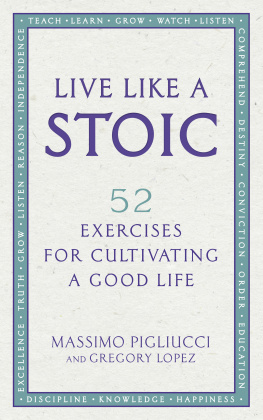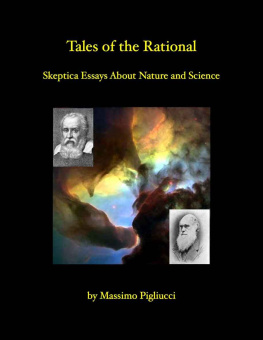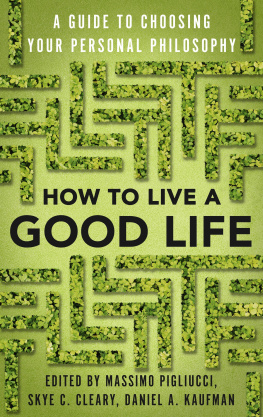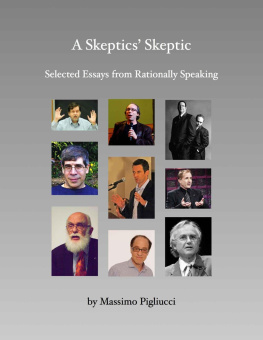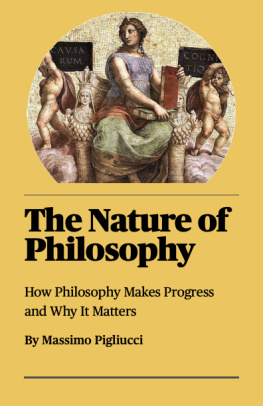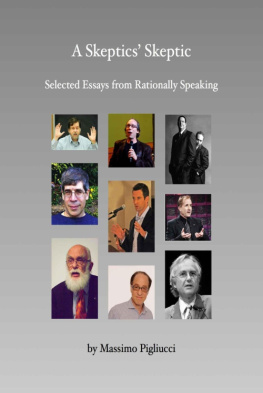Massimo Pigliucci - A Field Guide to a Happy Life
Here you can read online Massimo Pigliucci - A Field Guide to a Happy Life full text of the book (entire story) in english for free. Download pdf and epub, get meaning, cover and reviews about this ebook. year: 2020, publisher: Basic Books, genre: Religion. Description of the work, (preface) as well as reviews are available. Best literature library LitArk.com created for fans of good reading and offers a wide selection of genres:
Romance novel
Science fiction
Adventure
Detective
Science
History
Home and family
Prose
Art
Politics
Computer
Non-fiction
Religion
Business
Children
Humor
Choose a favorite category and find really read worthwhile books. Enjoy immersion in the world of imagination, feel the emotions of the characters or learn something new for yourself, make an fascinating discovery.

- Book:A Field Guide to a Happy Life
- Author:
- Publisher:Basic Books
- Genre:
- Year:2020
- Rating:5 / 5
- Favourites:Add to favourites
- Your mark:
- 100
- 1
- 2
- 3
- 4
- 5
A Field Guide to a Happy Life: summary, description and annotation
We offer to read an annotation, description, summary or preface (depends on what the author of the book "A Field Guide to a Happy Life" wrote himself). If you haven't found the necessary information about the book — write in the comments, we will try to find it.
A Field Guide to a Happy Life — read online for free the complete book (whole text) full work
Below is the text of the book, divided by pages. System saving the place of the last page read, allows you to conveniently read the book "A Field Guide to a Happy Life" online for free, without having to search again every time where you left off. Put a bookmark, and you can go to the page where you finished reading at any time.
Font size:
Interval:
Bookmark:
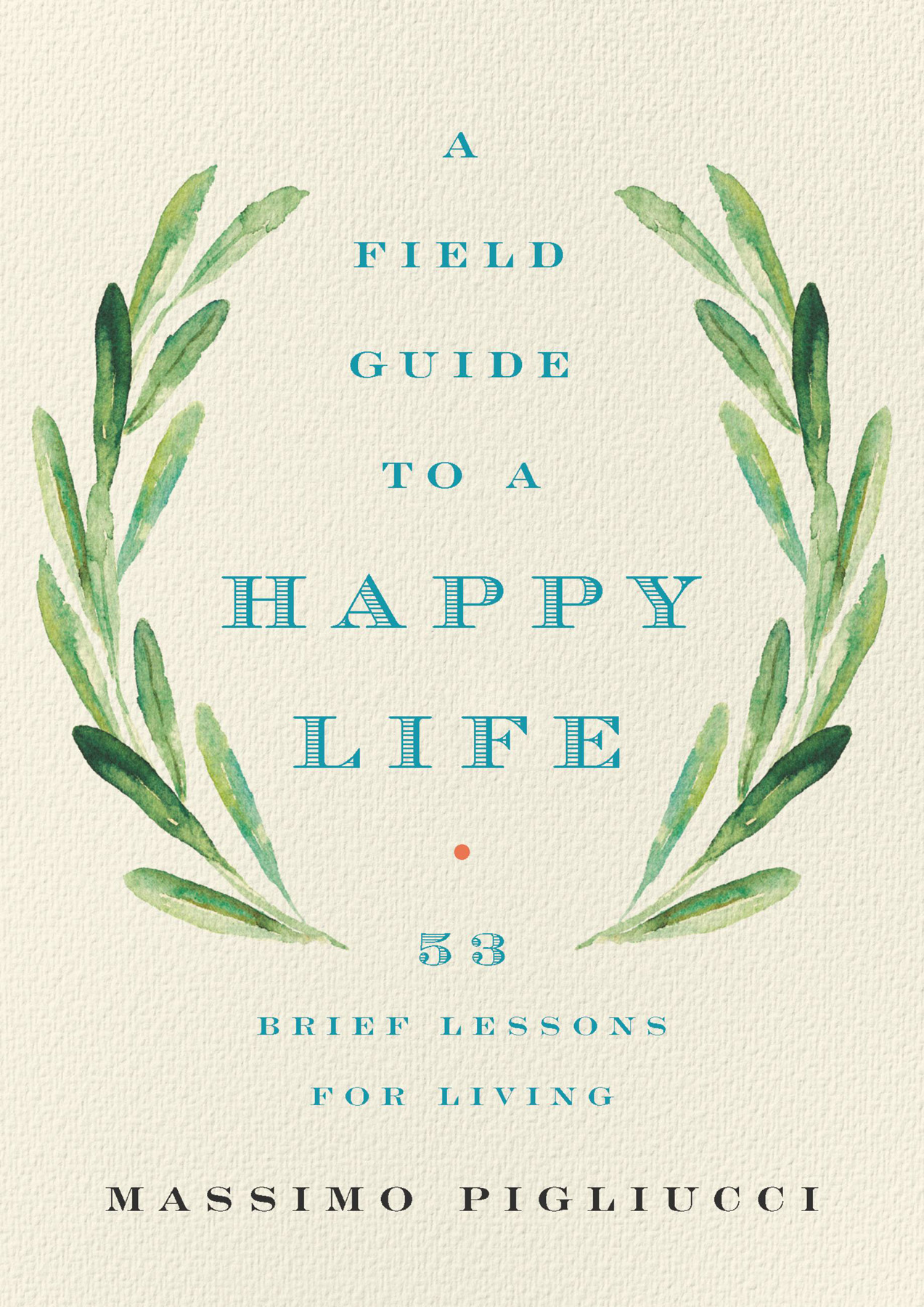
Copyright 2020 by Massimo Pigliucci
Cover design by Chin-Yee Lai
Cover image Verisstudio / Shutterstock.com
Cover copyright 2020 Hachette Book Group, Inc.
Hachette Book Group supports the right to free expression and the value of copyright. The purpose of copyright is to encourage writers and artists to produce the creative works that enrich our culture.
The scanning, uploading, and distribution of this book without permission is a theft of the authors intellectual property. If you would like permission to use material from the book (other than for review purposes), please contact permissions@hbgusa.com. Thank you for your support of the authors rights.
Basic Books
Hachette Book Group
1290 Avenue of the Americas, New York, NY 10104
www.basicbooks.com
First Edition: November 2020
Published by Basic Books, an imprint of Perseus Books, LLC, a subsidiary of Hachette Book Group, Inc. The Basic Books name and logo is a trademark of the Hachette Book Group.
The Hachette Speakers Bureau provides a wide range of authors for speaking events. To find out more, go to www.hachettespeakersbureau.com or call (866) 376-6591.
The publisher is not responsible for websites (or their content) that are not owned by the publisher.
Library of Congress Cataloging-in-Publication Data
Names: Pigliucci, Massimo, 1964author.
Title: A field guide to a happy life : 53 brief lessons for living / Massimo Pigliucci.
Description: New York : Basic Books, 2020. | Includes bibliographical references.
Identifiers: LCCN 2020009777 | ISBN 9781541646933 (hardcover) | ISBN 9781541646940 (ebook)
Subjects: LCSH: Conduct of life. | Epictetus. Manual. | Stoics.
Classification: LCC BJ1531 .P55 2020 | DDC 171/.2dc23
LC record available at https://lccn.loc.gov/2020009777
ISBNs: 978-1-5416-4693-3 (hardcover); 978-1-5416-4694-0 (e-book)
E3-20200815-JV-NF-ORI
A FIELD GUIDE TO
A HAPPY LIFE
Pigliucci reimagines Epictetuss Handbook (a.k.a. the Enchiridion) and updates it for the twenty-first century. The result is a work more timely than ever, for it warns us of the dangers of superstition while it reminds us that reason and virtue are essential to happiness. Pigliucci speaks directly to us as readers and justifies his updates along the way. He thereby invites us to treat Epictetus and this very book as a reasonable guide rather than as an oracle from on high.
Brian E. Johnson, Fordham University
This is a bold, contemporary updating of Stoicism for the present day. Taking the ancient Stoic Epictetus as his inspiration, Pigliucci has rewritten Epictetuss Handbook in order to update it, make it more relevant to a modern audience, but also to ensure that the core Stoic ideas shine through. The result is what Pigliucci calls Stoicism 2.0. This is a manual for living for those who approach the ancient Stoics as guides, not masters.
John Sellars, author of Stoicism
An engaging introduction to the Stoic life through an updated version of Epictetuss Handbook. An unusual and helpful feature is an appendix in which Pigliucci highlights his modifications of the original Stoic text to take account of modern thinking.
Christopher Gill, author of Greek Thought
To my wife, Jennifer, whose love and support
are making it easy to live a happy life.
M y life changed instantly, and for the better, in the fall of 2014. At least, an important, impactful, and positive change began then, and is continuing now. The trigger was my first reading of a philosopher I had never heard of, despite the fact that he was a household name for eighteen centuries or thereabout: Epictetus. The words in questions were,
I have to die. If it is now, well then I die now; if later, then now I will take my lunch, since the hour for lunch has arrivedand dying I will tend to later.
It blew my mind. Who the heck was this first-century guy who in two sentences displayed both a delightful sense of humor and a no-nonsense attitude toward life, and death? We dont really know much about him. Not even his real name. Epktetos ( ) in Greek simply means acquired, since he was a slave, born around the year 55 in Hierapolis (modern-day Pamukkale, in western Turkey). He was bought by Epaphroditos, a wealthy freedman and secretary to the emperor Nero.
) in Greek simply means acquired, since he was a slave, born around the year 55 in Hierapolis (modern-day Pamukkale, in western Turkey). He was bought by Epaphroditos, a wealthy freedman and secretary to the emperor Nero.
Sometime after moving to Rome, Epictetus began to study Stoic philosophy with the most prestigious teacher of the time, Musonius Rufus. That may have helped him on the occasion of a defining episode in his life, when he became crippled. Origen tells us how Epictetus handled it:
Might you not, then, take Epictetus, who, when his master was twisting his leg, said, smiling and unmoved, You will break my leg; and when it was broken, he added, Did I not tell you that you would break it?
Eventually Epictetus obtained his freedom and began to teach philosophy in Rome. At first, it didnt go too well. Referring to an episode that happened to him while he was expounding philosophy in the streets of the imperial capital, he recounted to one of his students,
You run the risk of [someone] saying, What business is that of yours, sir? What are you to me? Pester him further,
Apparently, he wasnt annoying just to people in the street. Like many other Stoics before and after him, he had a dangerous tendency to speak truth to power, so the emperor Domitian exiled him in the year 93. Undaunted, he moved to Nicopolis, in northwestern Greece, and established a school there. It became the most renowned place to learn philosophy in the entire Mediterranean, and a later emperor, Hadrian, stopped by to visit and pay his regards to the famous teacher.
Epictetus, just like his role model, Socrates, did not write anything down, focusing instead on teaching and talking to his many students. Thankfully, one of them was Arrian of Nicomedia, who later became a public servant, military commander, historian, and philosopher in his own right. The only two sets of teachings we have from Epictetus are Arrians notes, collected in four books of Discourses (half of which are unfortunately lost) and a short handbook, or manual, known as the Enchiridion.
Epictetus lived a simple life, unmarried and owning few things. In his old age he adopted a friends child, who would have otherwise been exposed to death, and raised him with the help of a woman. He died around 135 CE, approximately
Back to my own discovery of Epictetus. I was positively stunned. Why had I never come across his writings before? Or even his name (such as it is)? I was fairly well acquainted with the other major Stoics, particularly Seneca and Marcus Aurelius, but Epictetus didnt come up even during my graduate studies in philosophy! His star may have been eclipsed among modern professional philosophers, occupied as they too often are in precisely the sort of logical hairsplitting that the sage from Hierapolis disdained. But his influence has been constant throughout the centuries, and continues to grow.
Not only did the writings and teachings of Epictetus, and in particular his handbook, influence the last of the Roman Stoics, the emperor Marcus Aurelius, but the Enchiridion was translated and updated by Christians throughout the Middle Ages, and used as a manual of spiritual exercises by monks in monasteries. The first printed edition, translated in Latin, was the work of Angelo Poliziano in 1479, who dedicated it to the Medici of Florence. The book arguably reached its popular height in the period 1550 to 1750, between the Renaissance and the Enlightenment. The first English translation (based on a French original) was by James Sandford in 1567. The Jesuit missionary Matteo Ricci translated it in Chinese in the early seventeenth century. John Harvard bequeathed a copy to his newly founded college in 1638, and Adam Smith, Benjamin Franklin, and Thomas Jefferson all had copies in their personal libraries.
Font size:
Interval:
Bookmark:
Similar books «A Field Guide to a Happy Life»
Look at similar books to A Field Guide to a Happy Life. We have selected literature similar in name and meaning in the hope of providing readers with more options to find new, interesting, not yet read works.
Discussion, reviews of the book A Field Guide to a Happy Life and just readers' own opinions. Leave your comments, write what you think about the work, its meaning or the main characters. Specify what exactly you liked and what you didn't like, and why you think so.

